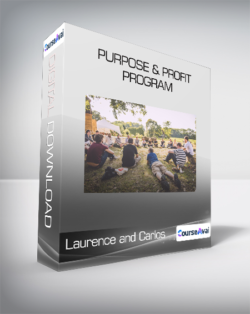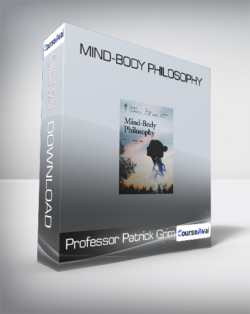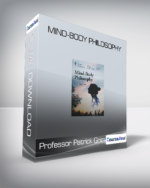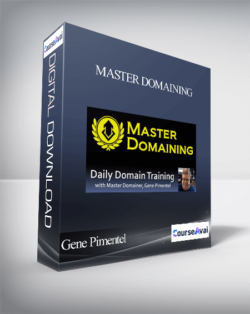How the physical body affects the mind, although we usually think of the mind “being in charge of” the body.How the fields of psychology and neuroscience have contributed to the mind-body discussion and what solutions each has to offer.Purchase Professor Patrick Grim – mind-Body Philosophy courses at here with PRICE $234.95 $48Professor Patrick Grim – mind-Body PhilosophyThe question of consciousness has mystified humanity for millennia. Even those of us who do not specialize in philosophy or science may be prompted to examine these all-consuming mysteries, asking questions like: how does the three pounds of gray matter in each of our skulls creates all the subjective experiences of our lives every single day, and define the experiences we call reality? We know it is the mind that allows us to witness and process the changes at every stage of life—and question them. But how does it work? And how much of our existence is defined by our physical substance versus our mental reality? Is the mind part of the body? Or could the body be part of the mind? And if they are separate, what is it that allows them to work together so seamlessly? These questions and more comprise the puzzle known as the mind-body problem. In Mind-Body Philosophy, Professor Patrick Grim of the State University of New York at Stony Brook leads an intellectually exhilarating tour through questions and theories addressing one of life’s greatest mysteries. These 24 lectures address enduring mysteries through the lenses of both philosophy and its offspring, science. You will learn how some of the greatest thinkers have addressed and attempted to solve the mind-body problem. But you won’t just be a spectator; Dr. Grim thoroughly engages with the questions from all sides and encourages you to come to your own conclusions. With an easygoing conversational manner, a contagious passion for his subject—and supported by illustrations, infographics, brain scans, videos, demonstrations, and on-screen text—Dr. Grim breaks down even the most complex theories into easily accessible parts. He guides you through a multidisciplinary search for truth using multiple philosophical lenses as well as neuroscience, mathematics, psychology, metaphysics, theology, and more. The History of the Mind-Body Question As you look into the 20th century and beyond, you will examine how the fields of psychology and neuroscience have contributed to the discussion. Through the lens of modern thought, you will look at: How the physical body affects the mind, although we usually think of the mind “being in charge of” the body.How the fields of psychology and neuroscience have contributed to the mind-body discussion and what solutions each has to offer.How dreams, hallucinations, and experiences under anesthesia help us better understand consciousness.How we create memories and explore the relationship between memories and the concept of self.How the latest research on the complex relationships between mind, body, and emotions reveals surprising conclusions about the role of emotions in our lives and thoughts.How the exciting recent discoveries of neuroscience relate to our perceptions of the world.How binding in the brain could relate to consciousness and the mind-body problem. Lessons in Consciousness through Computers In the early 20th century, philosopher Ludwig Wittgenstein and mathematician Alan Turing both asked the question: “Is it possible for machines to think?” While Wittgenstein examined the role of language, Turing focused on machines and their prospects for computation. All contemporary computers—along with the fields of artificial intelligence and computational neural networks—trace their history back to Turing’s vision. Computers now exist everywhere in our daily lives. But can they “think?” Dr. Grim presents many of the theories that attempt to answer this question, including: Wittgenstein’s theories addressing the brain and language;The Turing test, which asks whether or not we could build a machine that would be indistinguishable from a human under specific conditions;Why some of the earliest developers of Artificial Intelligence believed they had solved the mind-body problem, and where they went wrong;Whether or not we can now claim to have intelligent machines, given that some computer programs can teach themselves new information;What computer science and information theory have taught us about the mind, intelligence, and consciousness.Get Professor Patrick Grim – mind-Body Philosophy downloadFascinating Thought Experiments In Mind-Body Philosophy, Dr. Grim provides exciting analyses via thought experiments—mental exercises philosophers and scientists use to learn about the world around them. From Plato to Einstein, great thinkers in a variety of disciplines have used thought experiments to validate disparate theories. Dr. Grim also encourages us to develop our own thought experiments and, in a humorous but well-accepted philosophical line of inquiry, he suggests we consider . . . zombies. After all, zombies are just like us but without consciousness, making them particularly well-suited subjects for the mind-body problem. In addition, Dr. Grim shares the enthralling classic thought experiments: Jackson’s “Mary’s Room,” exploring the non-physical nature of knowledge and mental statesLeibnitz’ “Giant Head,” examining whether or not perception and thought can be explained in purely mechanical termsWittgenstein’s “Beetle Boxes,” exploring the relationship between language and meaning, and public and private languageSearle’s “Chinese Room,” exploring whether or not a computer—even one that seems extremely human-like—can have a mind or consciousnessBlock’s “China Brain,” which asks if it’s possible for something to be functionally equivalent to a human being and yet have no conscious experience. The big questions explored in this course don’t have easy answers. What you get instead is a new look at how our minds work, empowering you to draw your own philosophical conclusions based on scientific findings. And, as Dr. Grim points out, even without a formative solution, the passionate and informed pursuit of truth is a crucially important enterprise in itself.Purchase Professor Patrick Grim – mind-Body Philosophy courses at here with PRICE $234.95 $48
 Laurence and Carlos – Purpose & Profit Program
₹7,968.00
Laurence and Carlos – Purpose & Profit Program
₹7,968.00
 Hannah B. Harve – A Children’s Guide to Folklore and Wonder Tales
₹8,466.00
Hannah B. Harve – A Children’s Guide to Folklore and Wonder Tales
₹8,466.00
Professor Patrick Grim – mind-Body Philosophy
₹7,968.00






